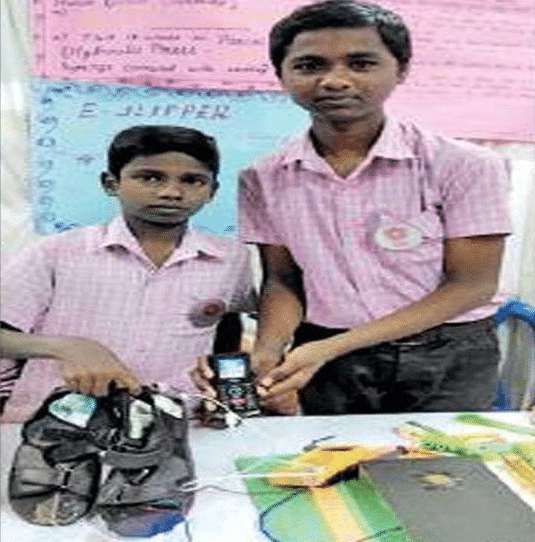Class 9 students in Tamil Nadu have come up with slippers. In case, it sounds too simple to you, you might have to rethink. These are not your ordinary pair of slippers! So, what makes these slippers special? It comes with more power!
Tiruttani Village has a shortage of streetlights and because of this, the area has become accident prone as the roads are unlit and the driving in the dark can prove to be fatal. Therefore, the students S Parthiban and VM Akashvaran, students of Government Higher Secondary School have invented E-Slippers, which will help one to spot a person walking on the road and slow down in case you are driving. Not just that, it can also be used to charge your mobile phones while you are walking.
The students showcased their invention at the South Indian States Science Fair 2019 at St Joseph’s Indian High School.

In an interview with TOI, Parthiban told, “Most areas in our villages don’t have streetlights. So we thought of coming up with a solution which can prevent accidents on unlit roads. Those driving in the dark can spot a person walking on the road using the slipper and slow down.”
Another student, VM Akashvaran said that they have used piezo crystal plates below the slipper that is connected to an electronic circuit. “When one walks with the slippers, the plates will be compressed and generate an electromagnetic force, which in turn will produce electricity and lights up the slippers.”
There is a reason why everyone vouches for the fact that young minds are best minds.
In Puducherry, students from Sarada Vidyaniketan Government Aided High School have developed a smart helmet that can save petrol and also aims to cut the accident rates due to drunk driving.
The fun part is that the headgear is synced with the vehicle and will only function when the rider wears it. “If the rider is drunk, the vehicle will not start as we have fitted the helmet with an alcohol sensor. It’s also equipped with a smart key, which can check wastage of fuel at signals,” said Pranathi PB to TOI, who studies in 10th standard.
Apart from that, in Kerala, Sharat KS, a teacher used water hyacinth to create sanitary napkins that can absorb 12 times more and the best part is that the state government is likely to distribute them for free.
Another student from class 8, K Arun, who studies in a Government Higher Secondary School, Nagapatnam, said, “I have made a road cleaner mounted on a cycle, but I’m finding it difficult to explain it in English.”
There were more than 200 projects on display in the fair that aims to make the world cleaner, greener and safer.

